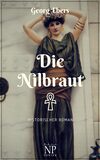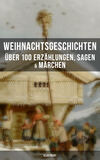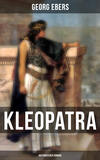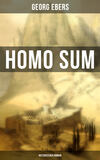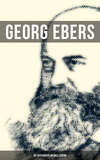Kitabı oku: «Homo Sum. Complete», sayfa 12
The Alexandrian stood aside motionless, so as not to disturb her, thinking to himself:
“These tears will wash away a large part of her suffering from her soul.”
When at last she was calmer, and began to dry her eyes, he went up to her, offered her the stone cup of water, and spoke to her kindly. She drank with eager satisfaction, and ate the last bit of bread that he could find in the pocket of his garment, soaking it in the water. She thanked him with the childlike sweetness that was peculiar to her, and then tried to rise, and willingly allowed him to support her. She was still very weary, and her head ached, but she could stand and walk.
As soon as Paulus had satisfied himself that she had no symptoms Of fever, he said, “Now, for to-day, you want nothing more but a warm mess of food, and a bed sheltered from the night-chill; I will provide both. You sit down here; the rocks are already throwing long shadows, and before the sun disappears behind the mountain I will return. While I am away, your four-footed companion here will while away the time.”
He hastened down to the spring with quick steps; close to it was the abandoned cave which he had counted on inhabiting instead of his former dwelling. He found it after a short search, and in it, to his great joy, a well preserved bed of dried plants, which he soon shook up and relaid, a hearth, and wood proper for producing fire by friction, a water-jar, and in a cellar-like hole, whose opening was covered with stones and so concealed from any but a practised eye, there were some cakes of hard bread, and several pots. In one of these were some good dates, in another gleamed some white meal, a third was half full of sesame-oil, and a fourth held some salt.
“How lucky it is,” muttered the anchorite, as he quitted the cave, “that the old anchorite was such a glutton.”
By the time he returned to Sirona, the sun was going down.
There was something in the nature and demeanor of Paulus, which made all distrust of him impossible, and Sirona was ready to follow him, but she felt so weak that she could scarcely support herself on her feet.
“I feel,” she said, “as if I were a little child, and must begin again to learn to walk.”
“Then let me be your nurse. I knew a Spartan dame once, who had a beard almost as rough as mine. Lean confidently on me, and before we go down the slope, we will go up and down the level here two or three times.” She took his arm, and he led her slowly up and down.
It vividly recalled a picture of the days of his youth, and he remembered a day when his sister, who was recovering from a severe attack of fever, was first allowed to go out into the open air. She had gone out, clinging to his arm into the peristyle of his father’s house; as he walked backward and forwards with poor, weary, abandoned Sirona, his neglected figure seemed by degrees to assume the noble aspect of a high-born Greek; and instead of the rough, rocky soil, he felt as if he were treading the beautiful mosaic pavement of his father’s court. Paulus was Menander again, and if there was little in the presence of the recluse, which could recall his identity with the old man he had trodden down, the despised anchorite felt, while the expelled and sinful woman leaned on his arm, the same proud sense of succoring a woman, as when he was the most distinguished youth of a metropolis, and when he had led forward the master’s much courted daughter in the midst of a shouting troop of slaves.
Sirona had to remind Paulus that night was coming on, and was startled, when the hermit removed her hand from his arm with ungentle haste, and called to her to follow him with a roughness that was quite new to him. She obeyed, and wherever it was necessary to climb over the rocks, he supported and lifted her, but he only spoke when she addressed him.
When they had reached their destination, he showed her the bed, and begged her to keep awake, till he should have prepared a dish of warm food for her, and he shortly brought her a simple supper, and wished her a good night’s rest, after she had taken it.
Sirona shared the bread and the salted meal-porridge with her dog, and then lay down on the couch, where she sank at once into a deep, dreamless sleep, while Paulus passed the night sitting by the hearth.
He strove to banish sleep by constant prayer, but fatigue frequently overcame him, and he could not help thinking of the Gaulish lady, and of the many things, which if only he were still the rich Menander, he would procure in Alexandria for her and for her comfort. Not one prayer could he bring to its due conclusion, for either his eyes closed before he came to the “Amen,” or else worldly images crowded round him, and forced him to begin his devotions again from the beginning, when he had succeeded in recollecting himself. In this half-somnolent state he obtained not one moment of inward collectedness, of quiet reflection; not even when he gazed up at the starry heavens, or looked down on the oasis, veiled in night, where many others like himself were deserted by sleep. Which of the citizens could it be that was watching by that light which he saw glimmering down there in unwonted brightness?—till he himself, overpowered by fatigue, fell asleep.
CHAPTER XIII
The light in the town, which had attracted Paulus, was in Petrus’ house, and burnt in Polykarp’s room, which formed the whole of a small upper-story, which the senator had constructed for his son over the northern portion of the spacious flat roof of the main building. The young man had arrived about noon with the slaves he had just procured, had learned all that had happened in his absence, and had silently withdrawn into his own room after supper was ended. Here he still lingered over his work.
A bed, a table on and under which lay a multitude of wax-tablets, papyrus-rolls, metal-points, and writing-reeds, with a small bench, on which stood a water-jar and basin, composed the furniture of this room; on its whitewashed walls hung several admirable carvings in relief, and figures of men and animals stood near them in long rows. In one corner, near a stone water-jar, lay a large, damp, shining mass of clay.
Three lamps fastened to stands abundantly lighted this work-room, but chiefly a figure standing on a high trestle, which Polykarp’s fingers were industriously moulding.
Phoebicius had called the young sculptor a fop, and not altogether unjustly, for he loved to be well dressed and was choice as to the cut and color of his simple garments, and he rarely neglected to arrange his abundant hair with care, and to anoint it well; and yet it was almost indifferent to him, whether his appearance pleased other people or no, but he knew nothing nobler than the human form, and an instinct, which he did not attempt to check, impelled him to keep his own person as nice as he liked to see that of his neighbor.
Now at this hour of the night, he wore only a shirt of white woollen stuff, with a deep red border. His locks, usually so well-kept, seemed to stand out from his head separately, and instead of smoothing and confining them, he added to their wild disorder, for, as he worked, he frequently passed his hand through them with a hasty movement. A bat, attracted by the bright light, flew in at the open window—which was screened only at the bottom by a dark curtain—and fluttered round the ceiling; but he did not observe it, for his work absorbed his whole soul and mind. In this eager and passionate occupation, in which every nerve and vein in his being seemed to bear a part, no cry for help would have struck his ear—even a flame breaking out close to him would not have caught his eye. His cheeks glowed, a fine dew of glistening sweat covered his brow, and his very gaze seemed to become more and more firmly riveted to the sculpture as it took form under his hand. Now and again he stepped back from it, and leaned backwards from his hips, raising his hands to the level of his temples, as if to narrow the field of vision; then he went up to the model, and clutched the plastic mass of clay, as though it were the flesh of his enemy.
He was now at work on the flowing hair of the figure before him, which had already taken the outline of a female head, and he flung the bits of clay, which he removed from the back of it, to the ground, as violently as though he were casting them at an antagonist at his feet. Again his finger-tips and modelling-tool were busy with the mouth, nose, cheeks, and eyes, and his own eyes took a softer expression, which gradually grew to be a gaze of ecstatic delight, as the features he was moulding began to agree more and more with the image, which at this time excluded every other from his imagination.
At last, with glowing cheeks, he had finished rounding the soft form of the shoulders, and drew back once more to contemplate the effect of the completed work; a cold shiver seized him, and he felt himself impelled to lift it up, and dash it to the ground with all his force. But he soon mastered this stormy excitement, he pushed his hand through his hair again and again, and posted himself, with a melancholy smile and with folded hands, in front of his creation; sunk deeper and deeper in his contemplation of it, he did not observe that the door behind him was opened, although the flame of his lamps flickered in the draught, and that his mother had entered the work-room, and by no means endeavored to approach him unheard, or to surprise him. In her anxiety for her darling, who had gone through so many bitter experiences during the past day, she had not been able to sleep. Polykarp’s room lay above her bedroom, and when his steps over head betrayed that, though it was now near morning, he had not yet gone to rest, she had risen from her bed without waking Petrus, who seemed to be sleeping. She obeyed her motherly impulse to encourage Polykarp with some loving words, and climbing up the narrow stair that led to the roof, she went into his room. Surprised, irresolute, and speechless she stood for some time behind the young man, and looked at the strongly illuminated and beautiful features of the newly-formed bust, which was only too like its well-known prototype. At last she laid her hand on her son’s shoulder, and spoke his name. Polykarp stepped back, and looked at his mother in bewilderment, like a man roused from sleep; but she interrupted the stammering speech with which he tried to greet her, by saying, gravely and not without severity, as she pointed to the statue, “What does this mean?”
“What should it mean, mother?” answered Polykarp in a low tone, and shaking his head sadly. “Ask me no more at present, for if you gave me no rest, and even if I tried to explain to you how to-day—this very day—I have felt impelled and driven to make this woman’s image, still you could not understand me—no, nor any one else.”
“God forbid that I should ever understand it!” cried Dorothea. “‘Thou shalt not covet thy neighbor’s wife,’ was the commandment of the Lord on this mountain. And you? You think I could not understand you? Who should understand you then, if not your mother? This I certainly do not comprehend, that a son of Petrus and of mine should have thrown all the teaching and the example of his parents so utterly to the wind. But what you are aiming at with this statue, it seems to me is not hard to guess. As the forbidden-fruit hangs too high for you, you degrade your art, and make to yourself an image that resembles her according to your taste. Simply and plainly it comes to this; as you can no longer see the Gaul’s wife in her own person, and yet cannot exist without the sweet presence of the fair one, you make a portrait of clay to make love to, and you will carry on idolatry before it, as once the Jews did before the golden calf and the brazen serpent.”
Polykarp submitted to his mother’s angry blame in silence, but in painful emotion. Dorothea had never before spoken to him thus, and to hear such words from the very lips which were used to address him with such heart-felt tenderness, gave him unspeakable pain. Hitherto she had always been inclined to make excuses for his weaknesses and little faults, nay, the zeal with which she had observed and pointed out his merits and performances before strangers as well as before their own family, had often seemed to him embarrassing. And now? She had indeed reason to blame him, for Sirona was the wife of another, she had never even noticed his admiration, and now, they all said, had committed a crime for the sake of a stranger. It must seem both a mad and a sinful thing in the eyes of men that he of all others should sacrifice the best he had—his Art—and how little could Dorothea, who usually endeavored to understand him, comprehend the overpowering impulse which had driven him to his task.
He loved and honored his mother with his whole heart, and feeling that she was doing herself an injustice by her false and low estimate of his proceedings, he interrupted her eager discourse, raising his hands imploringly to her.
“No, mother, no!” he exclaimed. “As truly as God is my helper, it is not so. It is true that I have moulded this head, but not to keep it, and commit the sin of worshipping it, but rather to free myself from the image that stands before my mind’s eye by day and by night, in the city and in the desert, whose beauty distracts my mind when I think, and my devotions when I try to pray. To whom is it given to read the soul of man? And is not Sirona’s form and face the loveliest image of the Most High? So to represent it, that the whole charm that her presence exercises over me might also be felt by every beholder, is a task that I have set myself ever since her arrival in our house. I had to go back to the capital, and the work I longed to achieve took a clearer form; at every hour I discovered something to change and to improve in the pose of the head, the glance of the eye or the expression of the mouth. But still I lacked courage to put the work in hand, for it seemed too audacious to attempt to give reality to the glorious image in my soul, by the aid of gray clay and pale cold marble; to reproduce it so that the perfect work should delight the eye of sense, no less than the image enshrined in my breast delights my inward eye. At the same time I was not idle, I gained the prize for the model of the lions, and if I have succeeded with the Good Shepherd blessing the flock, which is for the sarcophagus of Comes, and if the master could praise the expression of devoted tenderness in the look of the Redeemer, I know—nay, do not interrupt me, mother, for what I felt was a pure emotion and no sin—I know that it was because I was myself so full of love, that I was enabled to inspire the very stone with love. At last I had no peace, and even without my father’s orders I must have returned home; then I saw her again, and found her even more lovely than the image which reigned in my soul. I heard her voice, and her silvery bell-like laughter—and then—and then—. You know very well what I learned yesterday. The unworthy wife of an unworthy husband, the woman Sirona, is gone from me for ever, and I was striving to drive her image from my soul, to annihilate it and dissipate it—but in vain! and by degrees a wonderful stress of creative power came upon me. I hastily placed the lamps, took the clay in my hand, and feature by feature I brought forth with bitter joy the image that is deeply graven in my heart, believing that thus I might be released from the spell. There is the fruit which was ripened in my heart, but there, where it so long has dwelt, I feel a dismal void, and if the husk which so long tenderly enfolded this image were to wither and fall asunder, I should not wonder at it.—To that thing there clings the best part of my life.”
“Enough!” exclaimed Dorothea, interrupting her son who stood before her in great agitation and with trembling lips. “God forbid that that mask there should destroy your life and soul. I suffer nothing impure within my house, and you should not in your heart. That which is evil can never more be fair, and however lovely the face there may look to you, it looks quite as repulsive to me when I reflect that it probably smiled still more fascinatingly on some strolling beggar. If the Gaul brings her back I will turn her out of my house, and I will destroy her image with my own hands if you do not break it in pieces on the spot.”
Dorothea’s eyes were swimming in tears as she spoke these words. She had felt with pride and emotion during her son’s speech how noble and high-minded he was, and the idea that this rare and precious treasure should be spoilt or perhaps altogether ruined for the sake of a lost woman, drove her to desperation, and filled her motherly heart with indignation.
Firmly resolved to carry out her threat she stepped towards the figure, but Polykarp placed himself in her way, raising his arm imploringly to defend it, and saying, “Not to-day—not yet, mother! I will cover it up, and will not look at it again till to-morrow, but once—only once—I must see it again by sunlight.”
“So that to-morrow the old madness may revive in you!” cried Dorothea. “Move out of my way or take the hammer yourself.”
“You order it, and you are my mother,” said Polykarp.
He slowly went up to the chest in which his tools and instruments lay, and bitter tears ran down his cheeks, as he took his heaviest hammer in his hand.
When the sky has shown for many days in summer-blue, and then suddenly the clouds gather for a storm, when the first silent but fearful flash with it noisy but harmless associate the thunder-clap has terrified the world, a second and third thunder-bolt immediately follow. Since the stormy night of yesterday had broken in on the peaceful, industrious, and monotonous life by the senator’s hearth, many things had happened that had filled him and his wife with fresh anxiety.
In other houses it was nothing remarkable that a slave should run away, but in the senator’s it was more than twenty years since such a thing had occurred, and yesterday the goat-herd Miriam had disappeared. This was vexatious, but the silent sorrow of his son Polykarp was a greater anxiety to Petrus. It did not please him that the youth, who was usually so vehement, should submit unresistingly and almost indifferently to the Bishop Agapitus, who prohibited his completing his lions. His son’s sad gaze, his crushed and broken aspect were still in his mind when at last he went to rest for the night; it was already late, but sleep avoided him even as it had avoided Dorothea. While the mother was thinking of her son’s sinful love and the bleeding wound in his young and betrayed heart, the father grieved for Polykarp’s baffled hopes of exercising his art on a great work and recalled the saddest, bitterest day of his own youth; for he too had served his apprenticeship under a sculptor in Alexandria, had looked up to the works of the heathen as noble models, and striven to form himself upon them. He had already been permitted by his master to execute designs of his own, and out of the abundance of subjects which offered themselves, he had chosen to model an Ariadne, waiting and longing for the return of Thescus, as a symbolic image of his own soul awaiting its salvation. How this work had filled his mind! how delightful had the hours of labor seemed to him!—when, suddenly, his stern father had come to the city, had seen his work before it was quite finished, and instead of praising it had scorned it; had abused it as a heathen idol, and had commanded Petrus to return home with him immediately, and to remain there, for that his son should be a pious Christian, and a good stone-mason withal—not half a heathen, and a maker of false gods.
Petrus had much loved his art, but he offered no resistance to his father’s orders; he followed him back to the oasis, there to superintend the work of the slaves who hewed the stone, to measure granite-blocks for sarcophagi and pillars, and to direct the cutting of them. His father was a man of steel, and he himself a lad of iron, and when he saw himself compelled to yield to his father and to leave his master’s workshop, to abandon his cherished and unfinished work and to become an artizan and mail of business, he swore never again to take a piece of clay in his hand, or to wield a chisel. And he kept his word even after his fathers death; but his creative instincts and love of art continued to live and work in him, and were transmitted to his two sons.
Antonius was a highly gifted artist, and if Polykarp’s master was not mistaken, and if he himself were not misled by fatherly affection, his second son was on the high road to the very first rank in art—to a position reached only by elect spirits.
Petrus knew the models for the Good Shepherd and for the lions, and declared to himself that these last were unsurpassable in truth, power, and majesty. How eagerly must the young artist long to execute them in hard stone, and to see them placed in the honored, though indeed pagan, spot, which was intended for them. And now the bishop forbade him the work, and the poor fellow might well be feeling just as he himself had felt thirty years ago, when he had been commanded to abandon the immature first-fruits of his labor.
Was the bishop indeed right? This and many other questions agitated the sleepless father, and as soon as he heard that his wife had risen from her bed to go to her son, whose footsteps he too could hear overhead, he got up and followed her.
He found the door of the work-room open, and, himself unseen and unheard, he was witness to his wife’s vehement speech, and to the lad’s justification, while Polykarp’s work stood in the full light of the lamps, exactly in front of him.
His gaze was spell-bound to the mass of clay; he looked and looked, and was not weary of looking, and his soul swelled with the same awe-struck sense of devout admiration that it had experienced, when for the first time, in his early youth, he saw with his own eyes the works of the great old Athenian masters in the Caesareum.
And this head was his son’s work!
He stood there greatly overcome, his hands clasped together, holding his breath till his mouth was dry, and swallowing his tears to keep them from falling. At the same time he listened with anxious attention, so as not to lose one word of Polykarp’s.
“Aye, thus and thus only are great works of art begotten,” said he to himself, “and if the Lord had bestowed on me such gifts as on this lad, no father, nay, no god, should have compelled me to leave my Ariadne unfinished. The attitude of the body was not bad I should say—but the head, the face—Aye, the man who can mould such a likeness as that has his hand and eye guided by the holy spirits of art. He who has done that head will be praised in the latter days together with the great Athenian masters—and he-yes, he, merciful Heaven! he is my own beloved son!”
A blessed sense of rejoicing, such as he had not felt since his early youth, filled his heart, and Dorothea’s ardor seemed to him half pitiful and half amusing.
It was not till his duteous son took the hammer in his hand, that he stepped between his wife and the bust, saying kindly:
“There will be time enough to-morrow to destroy the work. Forget the model, my son, now that you have taken advantage of it so successfully. I know of a better mistress for you—Art—to whom belongs everything of beauty that the Most High has created—In Art in all its breadth and fulness, not fettered and narrowed by any Agapitus.”
Polykarp flung himself into his father’s arms, and the stern man, hardly master of his emotions, kissed the boy’s forehead, his eyes, and his cheeks.


